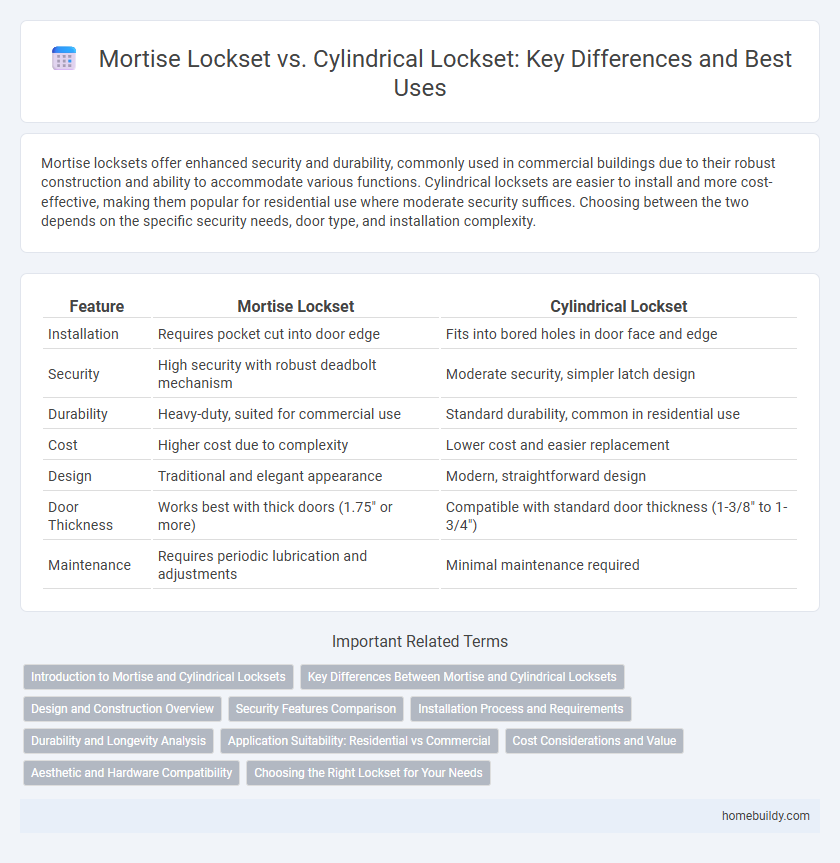Mortise locksets offer enhanced security and durability, commonly used in commercial buildings due to their robust construction and ability to accommodate various functions. Cylindrical locksets are easier to install and more cost-effective, making them popular for residential use where moderate security suffices. Choosing between the two depends on the specific security needs, door type, and installation complexity.
Table of Comparison
| Feature | Mortise Lockset | Cylindrical Lockset |
|---|---|---|
| Installation | Requires pocket cut into door edge | Fits into bored holes in door face and edge |
| Security | High security with robust deadbolt mechanism | Moderate security, simpler latch design |
| Durability | Heavy-duty, suited for commercial use | Standard durability, common in residential use |
| Cost | Higher cost due to complexity | Lower cost and easier replacement |
| Design | Traditional and elegant appearance | Modern, straightforward design |
| Door Thickness | Works best with thick doors (1.75" or more) | Compatible with standard door thickness (1-3/8" to 1-3/4") |
| Maintenance | Requires periodic lubrication and adjustments | Minimal maintenance required |
Introduction to Mortise and Cylindrical Locksets
Mortise locksets are traditional locking mechanisms installed inside a pocket within the door, offering enhanced security and durability for residential and commercial applications. Cylindrical locksets, commonly used in modern buildings, feature a simpler installation process with a locking mechanism housed within the door's cylindrical bored hole. Both locksets provide reliable access control, but mortise locks typically deliver stronger resistance against forced entry due to their robust internal structure.
Key Differences Between Mortise and Cylindrical Locksets
Mortise locksets require a pocket cut into the door edge, offering enhanced strength and durability ideal for commercial and heavy-duty residential applications, while cylindrical locksets are surface-mounted and easier to install, commonly used in standard residential doors. Mortise locks feature separate latch and deadbolt mechanisms within a single unit, providing greater security options, whereas cylindrical locks combine these components into a simpler assembly. The key distinction lies in installation complexity and locking mechanism design, with mortise locks generally favored for high-security needs and cylindrical locks preferred for affordability and quicker installation.
Design and Construction Overview
Mortise locksets feature a rectangular body installed into a pocket within the door, offering a more complex mechanism with separate latch and deadbolt components that provide enhanced security and durability. Cylindrical locksets utilize a simpler cylindrical mechanism housed within a round bore hole, allowing for easier installation and maintenance but typically offering less reinforcement. The design of mortise locks supports heavy-duty applications due to robust construction, while cylindrical locks prioritize convenience and cost-effectiveness for residential use.
Security Features Comparison
Mortise locksets offer enhanced security through a robust metal case installed within the door, providing resistance against forced entry and tampering. Cylindrical locksets feature simpler installation with a key cylinder mechanism but generally lack the structural strength and durability of mortise locks. The solid construction of mortise locksets typically results in higher pick resistance and better overall protection, making them preferable for commercial and high-security applications.
Installation Process and Requirements
Mortise locksets require precise door preparation, including a pocket chiseled into the door edge, demanding skilled installation and specific tools; they are best suited for solid wooden doors with adequate thickness. Cylindrical locksets install faster with a straightforward bore hole drilled through the door face and latch bored into the edge, compatible with a wider range of door types and thinner materials. Mortise locks offer enhanced strength and customization but involve more complex installation requirements compared to the simpler and quicker setup of cylindrical locksets.
Durability and Longevity Analysis
Mortise locksets offer superior durability and longevity due to their robust internal mechanism housed within a solid metal case installed inside the door, making them ideal for high-traffic or commercial applications. Cylindrical locksets, featuring a simpler design with components mounted on the surface of the door, generally provide less structural strength and shorter lifespan under heavy use. The mortise lockset's complex construction and heavy-duty materials contribute to enhanced resistance against wear and tampering compared to the more economical cylindrical lockset.
Application Suitability: Residential vs Commercial
Mortise locksets are highly suitable for commercial applications due to their durability, high security features, and compatibility with heavy-duty doors. Cylindrical locksets are typically preferred in residential settings for their ease of installation, cost-effectiveness, and sufficient security for home use. The choice between mortise and cylindrical locksets depends on the required security level, door construction, and frequency of use in residential versus commercial environments.
Cost Considerations and Value
Mortise locksets typically cost more upfront due to their complex installation and durable metal construction, offering enhanced security and longevity that justifies the investment for high-traffic or commercial settings. Cylindrical locksets are generally more affordable and easier to install, making them a cost-effective choice for residential use where budget constraints and convenience are important. Evaluating long-term value involves balancing installation expenses, durability, and security needs to determine the best lockset type for each specific application.
Aesthetic and Hardware Compatibility
Mortise locksets offer a classic and sophisticated aesthetic with customizable hardware options that blend seamlessly into traditional and high-end door designs, enhancing overall visual appeal. Cylindrical locksets provide a more streamlined and modern look suitable for contemporary interiors, while their hardware compatibility is generally limited to standard door preparations and thinner door thicknesses. Choosing between them depends on the desired architectural style and the specific hardware requirements of the door.
Choosing the Right Lockset for Your Needs
Mortise locksets provide enhanced security and durability with their complex internal mechanisms and heavy-duty construction, ideal for commercial and high-traffic residential doors. Cylindrical locksets offer easier installation and cost-effectiveness, suitable for standard residential use and moderate security requirements. Assessing door thickness, security level, and installation complexity ensures selecting the optimal lockset tailored to specific functional and safety needs.
Mortise lockset vs Cylindrical lockset Infographic

 homebuildy.com
homebuildy.com